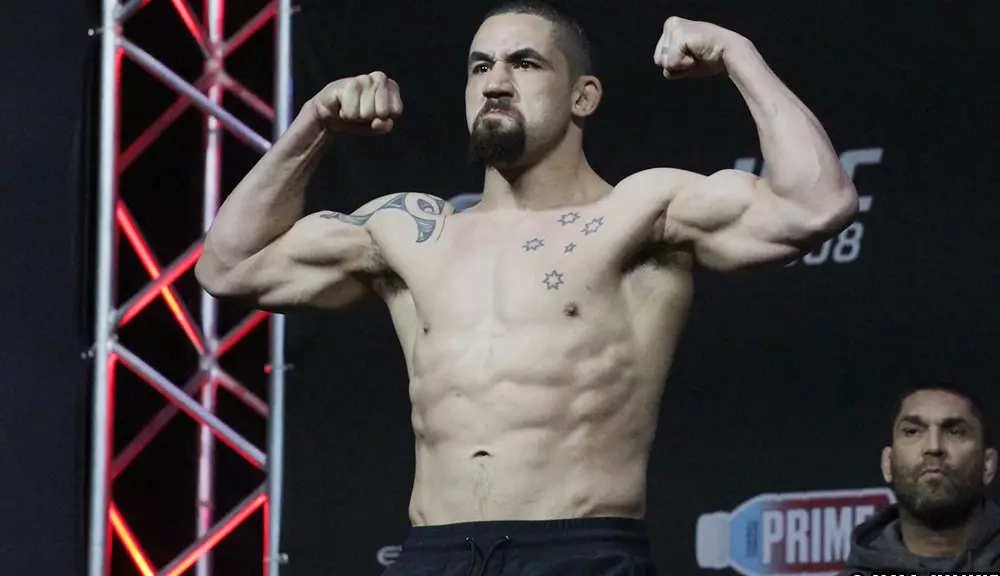Former UFC middleweight champion Robert Whittaker finds himself at a crucial juncture in his career. With recent setbacks, including a loss to Khamzat Chimaev at UFC 308, coupled with the saturation of talent within the middleweight division, the idea of transitioning to the light heavyweight class is drawing both attention and advocate in the form of Chael Sonnen. Having previously challenged for titles across both middleweight and light heavyweight categories himself, Sonnen presents a uniquely insightful perspective on Whittaker’s potential shift in weight classes.
Transitioning to light heavyweight would bring a wave of new opportunities for Whittaker. The middleweight division currently presents a logjam with numerous contenders vying for title shots, creating significant hurdles for the former champion to reclaim his place. On the other hand, the light heavyweight category seems ripe for exploration, offering a diluted pool of talent far removed from the chaos reigning at 185 pounds.
Sonnen contends that Whittaker, though approaching the middle stages of his career at 34, still retains the speed and skill set pivotal for success against larger opponents. His advocacy for Whittaker making the jump stems from personal insights into changing weight classes, suggesting that moving up could potentially prolong his effectiveness in the octagon. This idea hinges not only on the size disparity, but also on how a fighter’s agility can be capitalized on by facing opponents who may not share the same quickness.
Fighting Dynamics and Misconceptions About Size
In his advocacy for Whittaker’s move, Sonnen addresses a prevalent misconception in combat sports: that size, in and of itself, translates directly to an advantage. He indicates that the inherent advantages of height and reach don’t guarantee victories, emphasizing that many fighters have disproven this notion. The notable bout between Tyson Fury and Oleksandr Usyk serves as a relevant example, showcasing that skill, strategy, and speed often outweigh mere physical dimensions.
Sonnen’s commentary delves into the dynamics of speed versus size. As fighters age, there exists an undeniable diminishing return regarding reflexes and speed. However, the upside of facing slower opponents could mask these disadvantages for Whittaker, particularly if he opts to compete in a division where he can exploit quicker footwork and reaction times against bigger fighters who might not possess the same agility.
The prospect of engaging with light heavyweight competitors tantalizes not just Whittaker but fans and analysts alike. Sonnen points out specific matchups that could ignite interest in the division; for instance, a bout between Whittaker and Anthony Smith could serve as a significant draw. Furthermore, given the current standings where contenders are frequently shifting their positions, Whittaker’s introduction could shake up the landscape and establish compelling narratives within the division.
Interestingly, this transition could prevent Whittaker from falling into the shadows of an increasingly competitive middleweight ranking where opportunities may be limited. The light heavyweight category, with its shifting tides as fighters come and go, stands as a blank canvas for the former champion to make his mark afresh.
While the prospect of moving to light heavyweight arises, Whittaker’s decision is undoubtedly complex and laden with consideration. The successful transition necessitates not just a physical adjustment but a mental recalibration to adopt a strategy that might differ significantly from his middleweight approach. Whether he can harness his skills to adapt in a new weight class while also capturing the audience’s attention and desire for exciting fights remains to be seen.
In summation, Robert Whittaker’s contemplation of moving to light heavyweight opens up a new realm of possibilities for his career. With the insights provided by Chael Sonnen emphasizing the benefits of a strategic shift, fans eagerly await Whittaker’s next move. As the former champion explores this new potential chapter, the question arises: can a seasoned warrior become a formidable force in a new arena? The answer lies in his hands as he weighs the future of his storied career.

